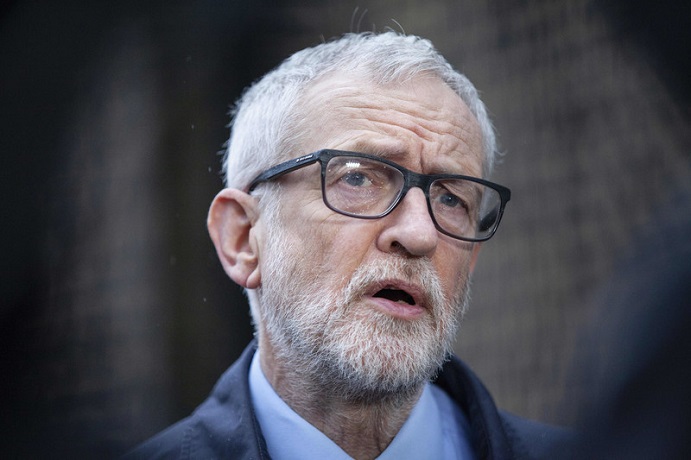
Asa Winstanley
The Electronic Intifada / October 29, 2020
The UK’s official equality watchdog has failed to find the Labour Party guilty of “institutional anti-Semitism,” after a 17-month investigation.
But the Equality and Human Rights Commission (EHRC) made a veiled swipe at former party leader Jeremy Corbyn in a much anticipated new report on Thursday.
It accuses the party of a “failure of leadership” during Corbyn’s tenure as well as “political interference” by his office over complaints of anti-Semitism.
It also accused two Labour figures – including former mayor of London Ken Livingstone – of “unlawful harassment” against unspecified Jewish people.
“Our investigation has identified serious failings in leadership and an inadequate process for handling anti-Semitism complaints across the Labour Party,” the report states.
But it makes no recommendation of any disciplinary action against individuals. The current Labour leader Keir Starmer said months ago he would implement all its recommendations.
The Campaign Against Antisemitism – one of the two pro-Israel lobby groups that referred Labour to the EHRC in the first place – demanded on Wednesday that heads should roll.
“Those responsible remain in the party and must be held to account,” their chief executive told The Guardian.
The EHRC’s impartiality has been widely called into question.
Its critics – including Corbyn – say it is too close to the ruling Conservatives and point to senior EHRC figures with close ties to the government and of the body’s refusal to act against anti-Black racism.
Former Labour lawmaker Chris Williamson told The Electronic Intifada that the report was “a major climb-down” and that he had been vindicated.
In its referral of Labour to the EHRC last year, pro-Israel group the Jewish Labour Movement had insisted that the body had a duty “to force the Labour Party to acknowledge that it has become institutionally anti-Semitic.”
But the final report published today notably makes no mention of that key allegation – a common smear made by pro-Israel lobby groups in the years since Corbyn became leader in 2015.
“The stitch-up had no legs,” said Williamson. “The serious accusations against me could not be sustained and the EHRC had to back down. I’ve been vindicated as a longstanding anti-racist campaigner.”
Williamson was suspended from the party in 2019 over false anti-Semitism allegations and later resigned in protest.
The Electronic Intifada understands that an earlier draft of the report contained findings against Williamson.
But after representations from Williamson’s lawyers, the EHRC wrote back that they would subsequently remove the findings before publication.
The report claims that “the Labour Party committed unlawful harassment through the actions of its agent, Ken Livingstone” (at the time a member of the ruling National Executive Committee) because in April 2016 he pointed to a “smear campaign by ‘the Israel lobby’ to stigmatize critics of Israel as anti-Semitic, as well as being aimed at undermining and disrupting the leadership of Jeremy Corbyn.”
Livingstone did this, the report says, by defending Labour lawmaker Naz Shah, who had posted an image to Facebook “suggesting that Israel should be relocated to the United States” and a second post “in which she appeared to liken Israeli policies to those of Hitler.”
Livingstone has always denied saying anything anti-Semitic. He told The Electronic Intifada that the draft EHRC report had not been sent to him before publication.
In a fuller statement after the report was published on Thursday, he defended his record saying, “As a life-long anti-racist, I am deeply hurt by – and fully reject – the accusations again being circulated across parts of the media.”
Livingstone’s defense of Shah led to a subsequent BBC radio interview in which he (accurately) pointed out that in the early 1930s when he first came to power, Nazi leader Adolf Hitler “was supporting Zionism.”
But the report does not mention the long-running controversy over this comment, which led to Livingstone twice being suspended by the party and ultimately forced to resign.
Instead it asserts that Shah’s posts were “anti-Semitic social media posts” and that merely by denying they were anti-Semitic, Livingstone was guilty of “unwanted conduct related to Jewish ethnicity,” which “had the effect of harassing members of the Labour Party.”
Consequences ?
The EHRC has the power under British law to force a body such as the Labour Party to come up with an “action plan” to address its rulings.
The report recommends Labour should commission an “independent process to handle and determine anti-Semitism complaints” for an unspecified period “until trust and confidence in the process is restored.”
Long a demand of the Jewish Labour Movement, Starmer has already committed to establishing an independent complaints procedure for anti-Semitism.
The EHRC does not have any power to sanction individuals.
But James Libson, a lawyer acting for the Jewish Labour Movement, said during a JLM public meeting held on Zoom in June that an EHRC ruling naming individuals could open the way to legal action against them.
“There may be avenues for individual people to bring [legal] proceedings themselves” against Labour figures, Libson said, “if the EHRC says that this person was subject to harassment, unlawful acts, or something of that nature.”
Having already played a major part in removing him as leader, the manufactured “anti-Semitism crisis” campaign which has been seeking to remove Corbyn from Labour altogether may yet achieve its maximal goal.
Asa Winstanley is an investigative journalist and associate editor with The Electronic Intifada; he lives in London












